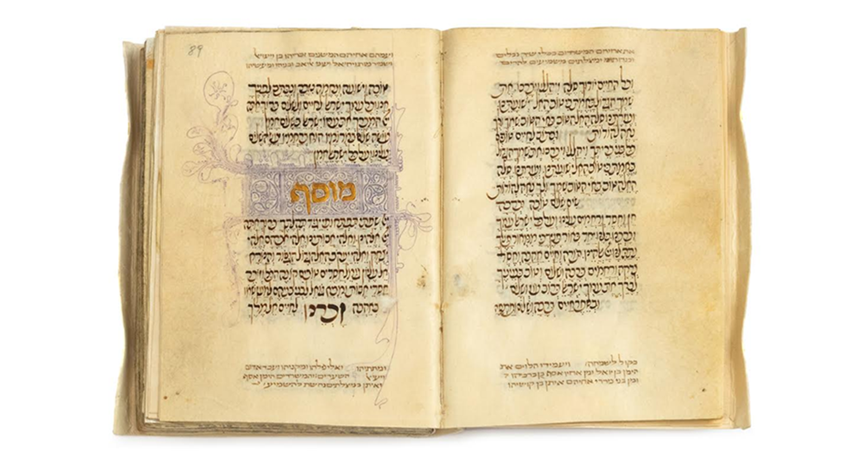Musaf prayer for Rosh Hashanah - page from the section of the rare 15th century Lisbon Mahzor now at the National Library of Israel. Credit: Courtesy of Kedem Auction House.
The National Library of Israel is delighted to announce that a rare 15th century Portuguese manuscript, once divided into three parts, has been reunited in Jerusalem.
The Lisbon Mahzor is a decorated small-format manuscript on parchment, probably written and illustrated in Lisbon, Portugal, in the second half of the 15th century. The manuscript includes prayers and piyyutim (liturgical poems) for the High Holidays, the Three Festivals and more, according to the Sephardic rite. It features artistic decorations throughout, typical of Portuguese manuscript illumination, with lace or filigree-like frames, and enriched with geometric and floral motifs.
The Mahzor was produced by the Lisbon school, which created masterpieces in the final days of Portuguese Jewry. During this period, the Jews of Spain had already been expelled from that country in 1492; some migrated to Portugal, where, for a short time, they were able to practice Judaism. In 1496 all Jews in Portugal were forced either to convert or were expelled.
Dr. Chaim Neria, Curator of NLI’s Haim and Hanna Solomon Judaica Collection, said, “Among the monumental works created during that period was the world-famous Lisbon Bible (now at the British Library) and other manuscripts, including the Mahzor Lisbon. It appears that even in their most difficult moments the Portuguese Jewish community did not give up its books – they took these cultural treasures along to their next destination.”
At some unknown point in time, the mahzor was split into three parts. The first, containing Sabbath prayers, arrived in Jerusalem in 1957. This volume, along with the famed Aleppo Codex, was given as a gift from the Aleppo Jewish community to President Yitzhak Ben-Zvi. The whereabouts of the other two volumes was a mystery until recently when they came up for auction. Due to their historical value, they were withdrawn from auction at the request of the Library and purchased on its behalf.
Dr. Neria adds, “Through electronic means, the Library will be able to reunite the digital versions of the three volumes for study and research,” adding, “The acquisition of this manuscript is an act of cultural preservation and historical rectification. That this treasure has ‘come home’ just at the time of Rosh Hashanah is especially meaningful, as the Jewish New Year is one of the most important liturgical moments in the Jewish calendar, a time of prayer, reflection, and renewal.”
The Lisbon Mahzor was purchased with support from the Haim and Hanna Solomon Judaica Foundation, and the generous assistance of the Zukier Family.


































